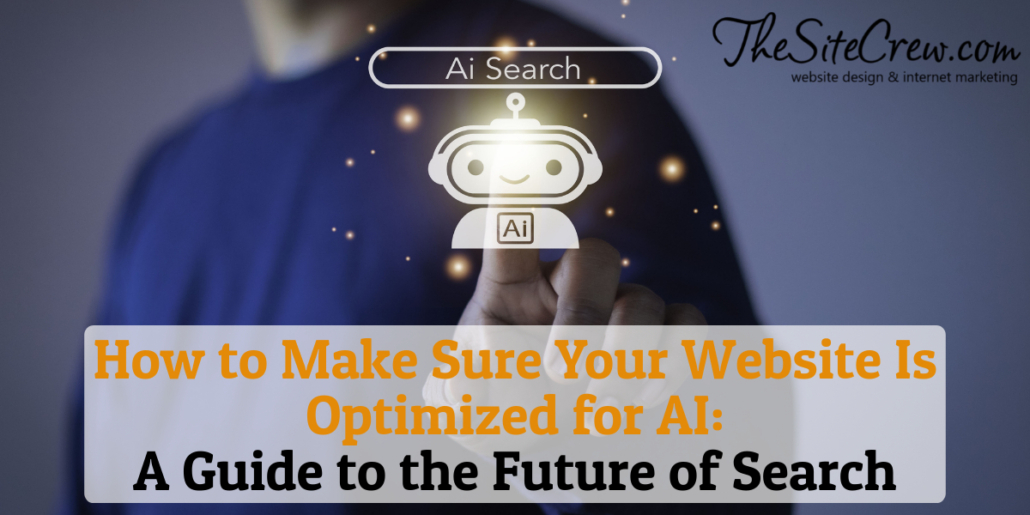How to Make Sure Your Website Is Optimized for AI: A Guide to the Future of Search

How to Make Sure Your Website Is Optimized for AI: A Guide to the Future of Search
The way we search for information online is changing, and AI is at the heart of this transformation. With the rise of AI Overviews in search results and the increasing use of AI chatbots, simply ranking for keywords isn't enough anymore. To stay ahead, you need to optimize your website not just for search engines, but for AI. This is a new frontier often referred to as AI Optimization (AIO), and it's all about making your content easy for intelligent systems to understand, cite, and use.
So, how do you make sure your website is ready for this new era of AI-powered search? It's a combination of good old-fashioned SEO best practices and a few key adjustments for the new landscape.
1. Master Your Technical SEO and Site Structure
Before any AI can understand your content, it needs to be able to find and crawl it. The fundamentals of good SEO are more important than ever.
- Make it crawlable: Ensure your site allows crawlers to access relevant public content. Check your
robots.txtfile and make sure you're not inadvertently blocking the bots that AI systems use to gather information. - Organize your site clearly: Use a logical and intuitive site structure. Descriptive URLs, well-organized directories for similar topics, and a clean sitemap are crucial for helping both human users and AI crawlers understand your site's hierarchy.
- Use headings correctly: Use a clear heading structure (H1, H2, H3, etc.) to logically break up your content. This acts as a roadmap for AI, helping it to quickly identify the main topic and its subtopics.
2. Prioritize High-Quality, Human-First Content
AI systems are designed to deliver the most helpful and reliable results. This means your content needs to be more than just a collection of keywords—it needs to be genuinely valuable.
- Answer questions directly: AI chatbots and search overviews are built to provide direct answers to user queries. Structure your content to answer common questions clearly and concisely. Use tools like Google's “People Also Ask” feature or AnswerThePublic to find the questions your audience is asking.
- Create comprehensive, in-depth content: AI algorithms favor content that provides a thorough exploration of a topic. Instead of just scratching the surface, aim to provide well-researched, authoritative, and complete information that satisfies user needs.
- Emphasize E-E-A-T: Google's principles of Expertise, Experience, Authoritativeness, and Trustworthiness (E-E-A-T) are paramount in the AI era. Showcase your expertise with author bios and credentials, and back up your claims with evidence, data, and links to reliable sources.
- Maintain a human touch: While AI can be a powerful tool for content creation, it's essential to use it to supplement, not replace, human expertise. The most valuable content offers unique insights, personal experience, and a voice that AI can't replicate.
3. Embrace Structured Data
Structured data is a powerful way to explicitly signal the meaning of your content to AI systems. It's like giving your website a machine-readable resume.
- Implement Schema Markup: Use schema markup, like
Schema.org, to label key elements of your content. For example, useFAQPagefor your frequently asked questions,HowTofor step-by-step guides, orProductandReviewschema for e-commerce pages. - Use JSON-LD: This is the format recommended by Google for implementing structured data. It's flexible and easy to manage, and it helps AI understand the context and relevance of your content, increasing the chances of it being featured in rich results or knowledge panels.
4. Build Your Brand and Authority
AI algorithms are more likely to cite and reference websites from strong, recognizable, and trustworthy brands.
- Encourage third-party mentions: Get your business mentioned on credible online news sites, review platforms, and relevant publications. Positive reviews, testimonials, and active engagement from your community are all signals that build authority.
- Foster a strong online presence: Consistent marketing activity across social media and email newsletters helps keep your brand top-of-mind and builds a robust online presence that AI can pick up on.
- Provide a great user experience: A well-designed, mobile-friendly website with clear navigation and fast loading speeds not only helps with traditional SEO, but also makes a great first impression and builds trust with both users and AI crawlers.
The shift to AI-powered search is an evolution, not a revolution. By focusing on these core principles, we'll not only prepare your website for the future of search, but also create a more valuable and trustworthy experience for your human audience.




